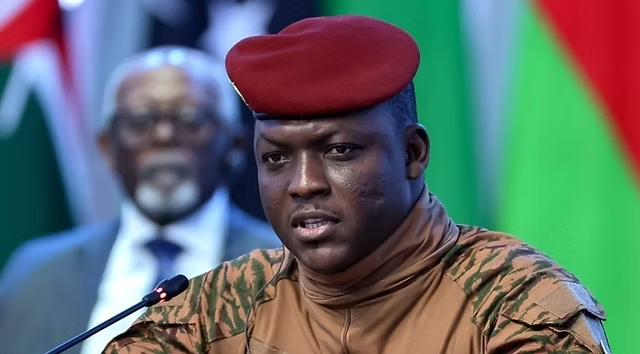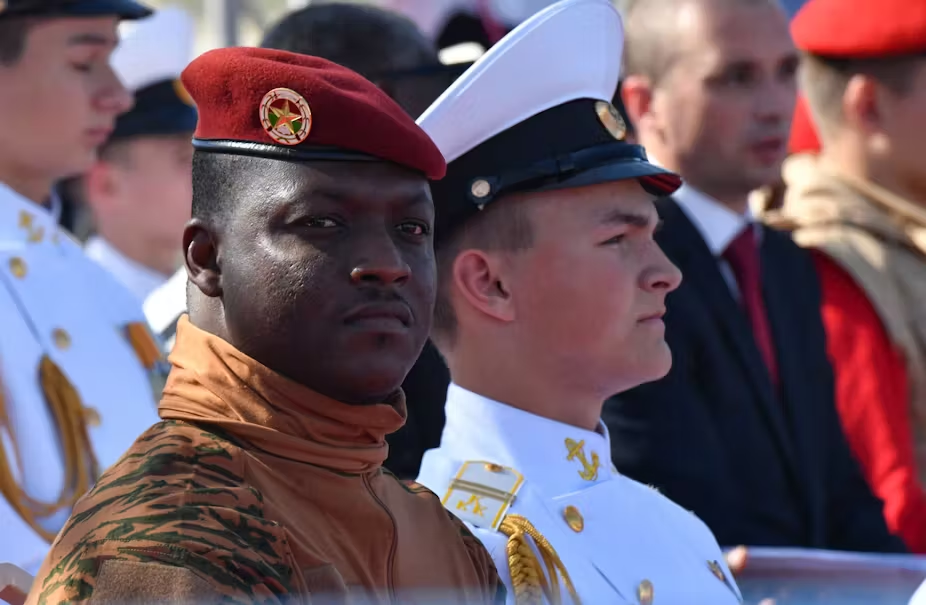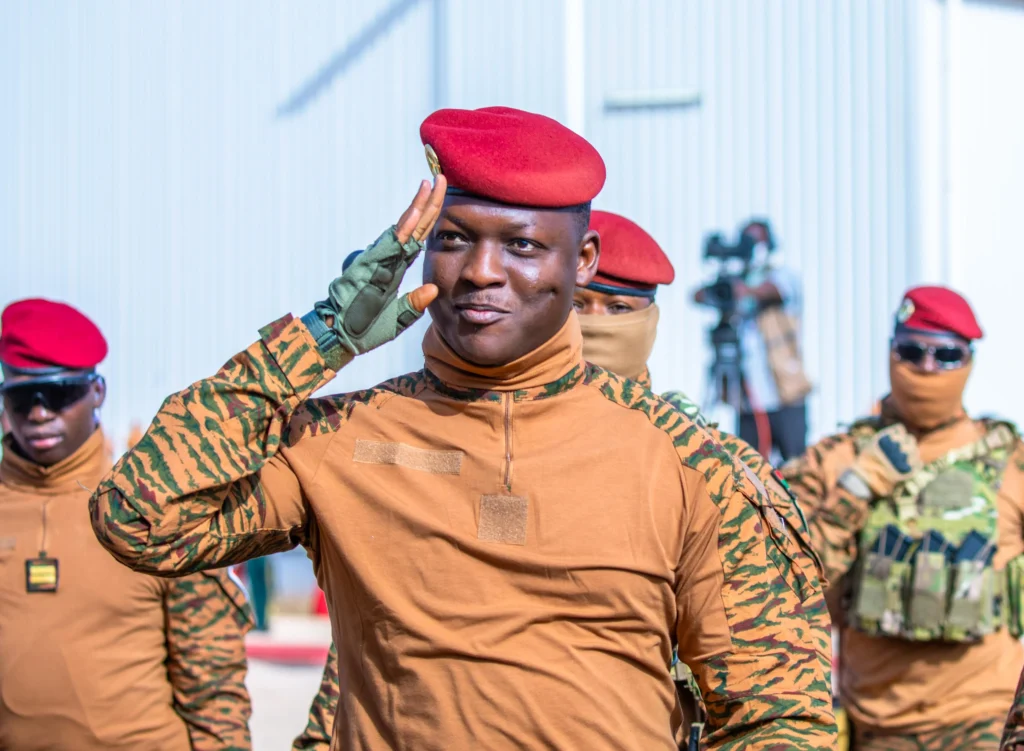Traoré’s revolution is tangible, redirecting Burkina Faso’s path from dependency to sovereignty, regional solidarity, and genuine national development.
Ibrahim Traoré Signals a New Era of Revolutionary Leadership in Africa


By Tswelopele Makoe
In the heart of Burkina Faso’s capital, a new landmark has emerged, one that stands for more than remembrance. The Thomas Sankara Mausoleum, designed by the renowned Pritzker Prize-winning Kéré Architecture, is a bold symbol of vision, renewal, and resistance. It is a declaration that the spirit of Thomas Sankara, the legendary pan-Africanist leader, endures, especially under the stewardship of Captain Ibrahim Traoré, Burkina Faso’s transitional president.
Sleek, dignified, and deeply rooted in African architectural identity, the mausoleum honours not only Sankara, assassinated in 1987 after just four transformative years in power, but also twelve of his fellow revolutionaries. Its inauguration drew international dignitaries, including South African anti-apartheid icon and former African Union Chairperson Dr. Nkosazana Dlamini-Zuma.
Former South African President Thabo Mbeki, though invited, was unable to attend, as he was hosting the 15th Thabo Mbeki Africa Day Lecture in Tanzania. The memorial stands as a powerful tribute to Sankara, whose influence resonated far beyond Burkina Faso’s borders.
But it is also a statement about contemporary Burkina Faso. Under President Traoré, a leader who enjoys significant popular support, the country is making bold strides in reclaiming its future. From education and healthcare to infrastructure and security, Burkina Faso is reasserting control over its own development.
By commissioning and championing the mausoleum, Traoré is not only preserving history, he is invoking it. He is reviving the political and philosophical principles that made Sankara both admired and feared: integrity, self-reliance, unapologetic anti-imperialism, and a deep commitment to the African people.

More than a monument, the mausoleum reclaims a narrative long overshadowed by pain and fear. Once a site of trauma, it is now a place of power, leadership, and positive transformation, a reflection of a wider African awakening and a refusal to let the continent’s heroes be erased or its destiny dictated by others.
This is not merely symbolic politics. Traoré’s revolution is tangible, redirecting Burkina Faso’s path from dependency to sovereignty, regional solidarity, and genuine national development. Notably, he withdrew Burkina Faso from ECOWAS, forming the Alliance of Sahel States with Mali and Niger, nations also led by post-coup administrations.
Traoré has also reversed his predecessor’s salary increases for government officials, choosing to remain on his military captain’s earnings, echoing the humility of leaders like Nelson Mandela and Gabon’s General Brice Oligui Nguema. He has ended military cooperation with former colonial power France, prioritizing local and national security forces and emphasizing the reclamation of land, resources, and national identity.
In many ways, the mausoleum is a metaphor for Traoré’s leadership: deeply rooted in a radical past, yet offering a platform for a reimagined future. Under his guidance, Burkina Faso is being shaped in bold, unapologetically African terms.
This is a revolution within a revolution, a cultural and psychological shift echoing Sankara’s emphasis on dignity. True leadership, Traoré demonstrates, is not about personality cults or grandstanding, but about purpose, vision, and service to the people. Through a renewed focus on agriculture, education, and public service, Traoré is rebuilding the foundations of Burkinabè society from the ground up.
The Sankara Mausoleum is thus invaluable, not as a shrine to the past, but as a beacon for the future. It reminds us that leadership is about purpose, not pomp. Traoré, like Sankara, leads with intention, not grandeur.
Critics, especially in Western circles, question the sustainability of Traoré’s break from former strategic partners. But such critiques must be weighed against decades of ineffective governance, chronic instability, and external interference that left Burkina Faso on the brink of collapse.
Traoré’s leadership is rooted in the pan-Africanist conviction that Africa can govern, defend, and define itself without relying on those who have historically profited from its vulnerabilities.

This model is gaining traction beyond Burkina Faso. From the Arab Maghreb Union in the north to the Southern African Development Community in the south, Traoré’s assertiveness has resonated with citizens across the continent. His actions have reignited the values of Pan-Africanism, not as a theory but as a practical, transformative political path.
Traoré, propelled by the will of the people rather than elite interests, represents a decisive break from the old order that prioritized foreign agendas over African futures. The reforms taking root today reflect a broader continental awakening, one where sovereignty, dignity, and justice are non-negotiable. Traoré is showing what is possible when leadership listens, acts, and stands firm.
The Thomas Sankara Mausoleum is more than a memorial; it is a cornerstone of a new national narrative. It signals to Burkinabè youth and to African youth everywhere that the cycles of the past need not be repeated. We can choose leaders who reflect our values, honour our history, and challenge the structures that have kept us marginalized for too long.
Ibrahim Traoré’s work is far from finished. But from policy reform to cultural renewal, he is already shifting the political horizon. The revolution he leads is not just about Burkina Faso’s future, it is a profound declaration of what Africa can yet achieve.
As Ethiopia’s Emperor Haile Selassie once said: “Throughout history, it has been the inaction of those who could have acted… that has made it possible for evil to triumph.” If the Sankara Mausoleum is the foundation, then what follows may well be the architecture of a new, sovereign, self-defined Africa. That is what true leadership looks like. While many invoke Sankara’s legacy, it is Traoré who most visibly fulfils his revolutionary challenge: “We must dare to invent the future.”
Tswelopele Makoe is a Gender & Social Justice Activist, Researcher, and Columnist. She is an Andrew W. Mellon scholar at the Desmond Tutu Centre for Religion and Social Justice, UWC. The views expressed are her own.
Subscribe to Our Newsletter
Keep in touch with our news & offers
Thank you for subscribing to the newsletter.
Oops. Something went wrong. Please try again later.










